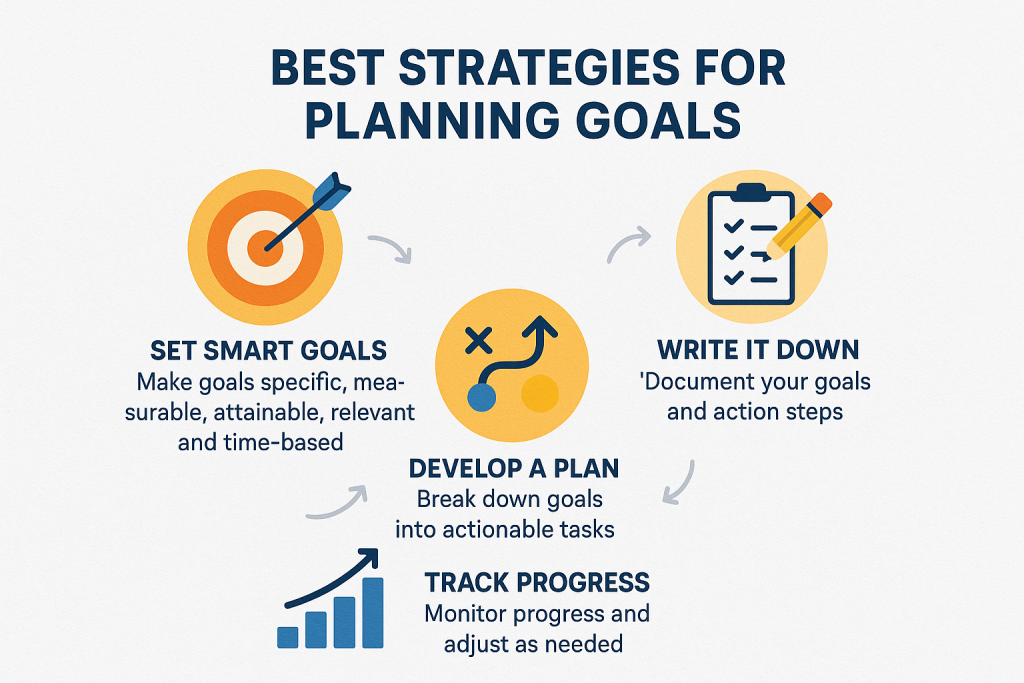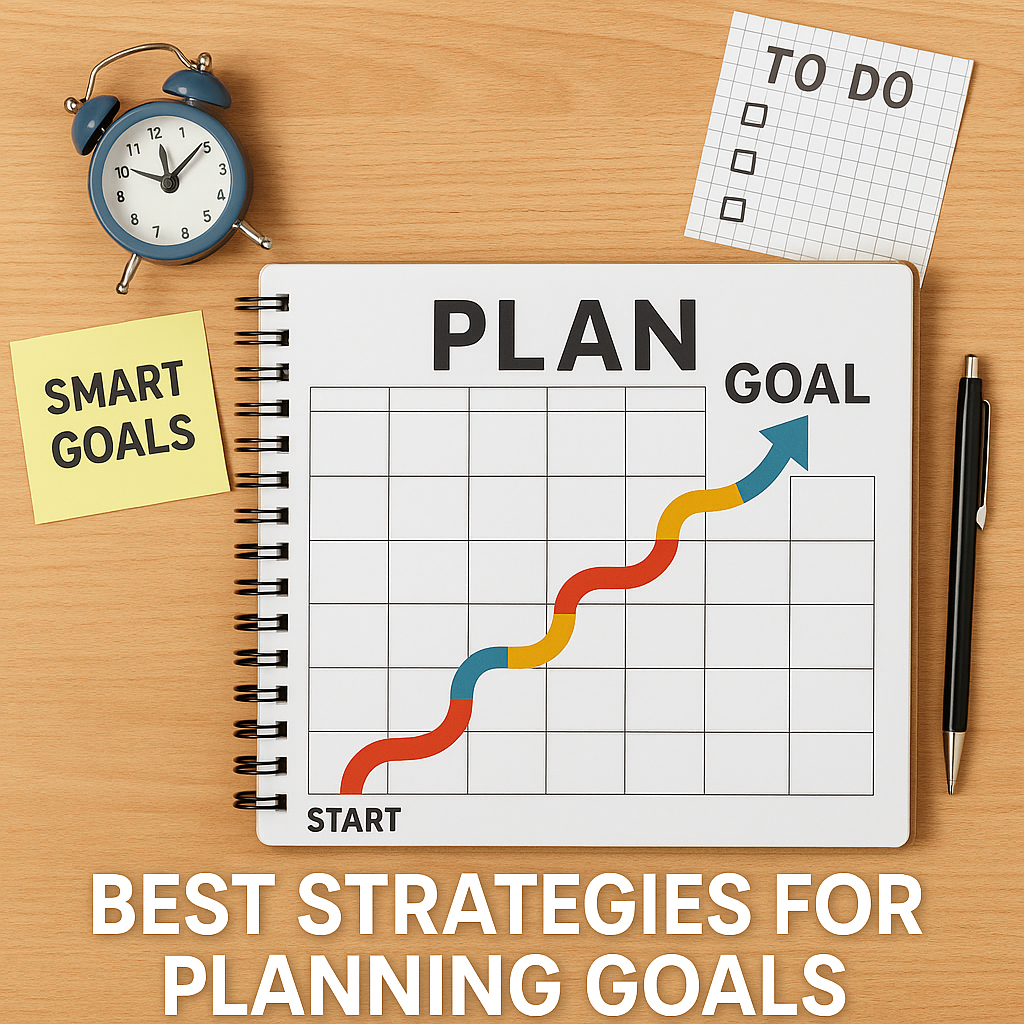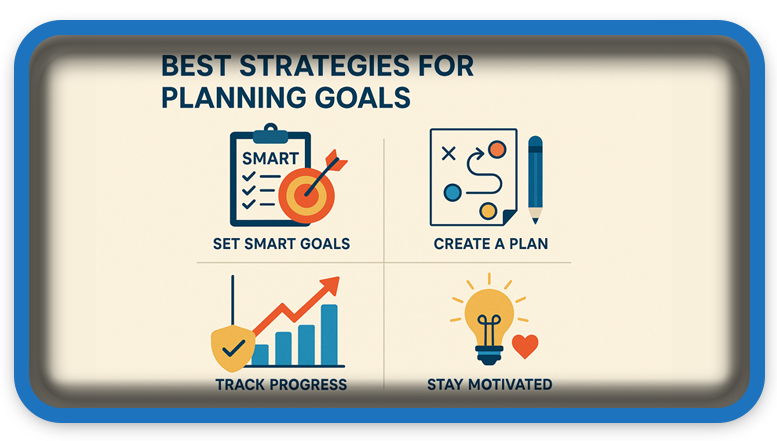⏲️ Estimated reading time: 4 min
Best Strategies for Planning Goals. Planning goals effectively is the foundation of success in personal life, business, and career growth. With the right strategies, you can set clear objectives, stay motivated, and achieve long-term results. Here’s a complete guide to mastering goal planning.
Every great achievement begins with a well-thought-out plan. Whether you want to improve your health, build a successful business, or achieve personal milestones, knowing how to plan your goals is essential. Many people fail not because they lack ambition but because they don’t structure their goals in a practical and achievable way.
In this article, we will explore the best strategies for planning goals, covering both personal and professional aspects of life.
Why Planning Goals Matters
Goal planning acts as a roadmap for your journey. Without goals, you may find yourself drifting without direction. When you set well-defined goals, you create clarity, focus, and a sense of purpose.
Key Benefits of Goal Planning
- Provides clear direction.
- Improves time management.
- Increases motivation.
- Helps track progress.
- Builds resilience against setbacks.
1. Start with Self-Reflection
Before setting goals, take time to understand your values, strengths, and weaknesses. Ask yourself:
- What matters most in my life right now?
- What skills or habits do I need to improve?
- What legacy do I want to leave behind?
Self-reflection ensures that your goals align with your true priorities, not just external expectations.
2. Use the SMART Framework
One of the most effective ways to set goals is by using the SMART method:
- Specific – Define your goal clearly.
- Measurable – Add criteria to track progress.
- Achievable – Make sure it’s realistic.
- Relevant – Align it with your long-term vision.
- Time-bound – Set a deadline to stay accountable.
Example: Instead of saying, “I want to be healthier,” say, “I will exercise for 30 minutes, five days a week, for the next three months.”
3. Break Big Goals into Smaller Steps
Large goals can feel overwhelming. To avoid procrastination, divide them into smaller, manageable tasks.
For instance, if your goal is to write a book, your steps may include:
- Research the topic.
- Create an outline.
- Write one chapter per week.
- Edit and revise.
- Publish.
Each small win boosts motivation and keeps momentum going.

4. Prioritize Your Goals
Not all goals are equally important. Trying to chase too many at once can lead to burnout. Instead, identify your top three priorities.
Ask yourself:
- Which goal will have the biggest impact on my life?
- Which goals can wait?
- Do any of my goals conflict with each other?
By prioritizing, you focus your energy where it matters most.
5. Create a Visual Roadmap
Visualization is a powerful tool for planning. Use tools like vision boards, digital planners, or goal-tracking apps. Seeing your goals daily reinforces commitment.
Some people prefer writing goals in journals, while others use online project management tools like Trello, Notion, or Google Calendar. The key is consistency.

6. Stay Flexible
Life is unpredictable, and sometimes plans need adjustments. Flexibility prevents frustration when things don’t go as expected.
Example: If your goal is to save $10,000 in a year but unexpected expenses arise, adjust your timeline instead of giving up.
7. Track Progress Regularly
Reviewing your progress weekly or monthly ensures you stay on track. Create checkpoints to measure how far you’ve come.
Simple methods include:
- Journaling your achievements.
- Using habit trackers.
- Reviewing performance every Sunday.
Progress tracking helps you celebrate small wins and keeps motivation alive.
8. Build Accountability
Accountability is crucial for achieving long-term goals. Share your goals with a trusted friend, mentor, or accountability partner.
Joining a group with similar interests (fitness groups, business masterminds, study circles) can also provide external motivation.
9. Overcome Procrastination
Even the best plans fail without action. To fight procrastination:
- Use the Pomodoro technique (work in 25-minute focused intervals).
- Eliminate distractions from your environment.
- Focus on starting small – momentum will build naturally.
10. Reward Yourself
Celebrating milestones keeps your journey enjoyable. Rewards don’t have to be big treat yourself to a movie night, a short trip, or something you enjoy.
Recognizing progress reminds you that hard work pays off.
Final Thoughts
Goal planning is not about perfection it’s about progress. With clarity, structure, and persistence, anyone can transform dreams into achievable results. The strategies shared here self-reflection, SMART planning, prioritization, visualization, flexibility, and accountability will help you design a future filled with success.
🔔 For more tutorials like this, consider subscribing to our blog.
📩 Do you have questions or suggestions? Leave a comment or contact us!
🏷️ Tags: goal planning, productivity tips, self-improvement, personal growth, success strategies, motivation, smart goals, time management, habit building, career planning
📢 Hashtags: #GoalPlanning, #SuccessTips, #PersonalGrowth, #Productivity, #Motivation, #SmartGoals, #SelfImprovement, #LifeGoals, #PlanningTips, #Mindset
Only logged-in users can submit reports.
Discover more from HelpZone
Subscribe to get the latest posts sent to your email.

